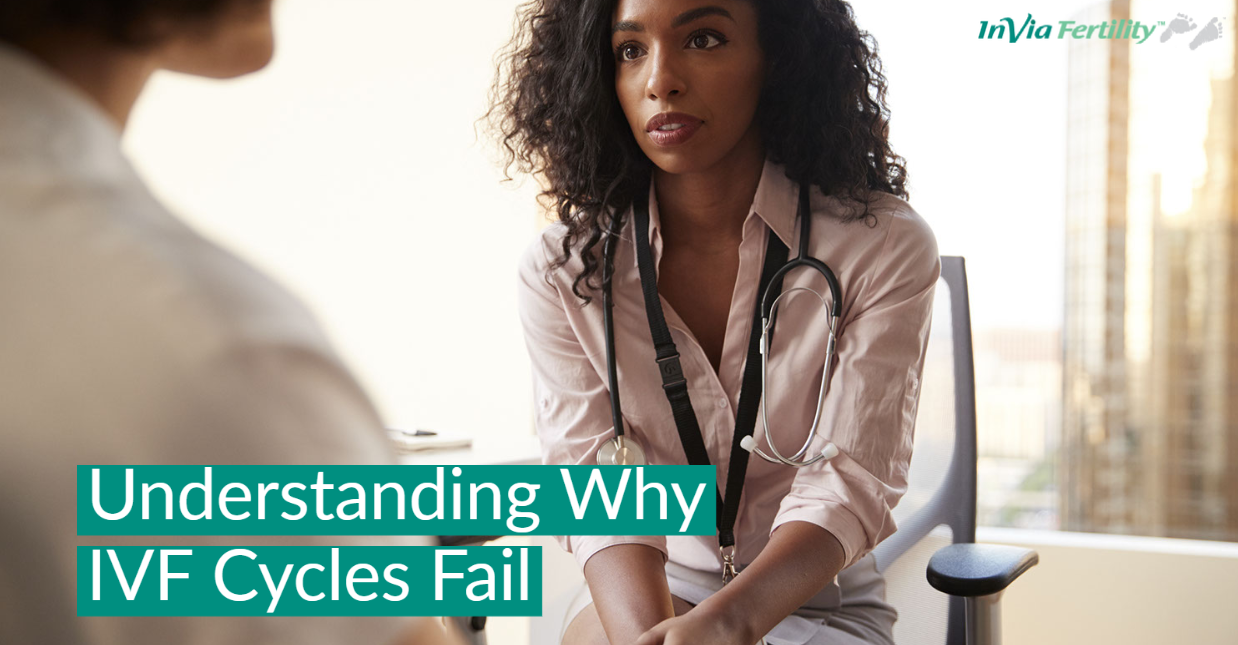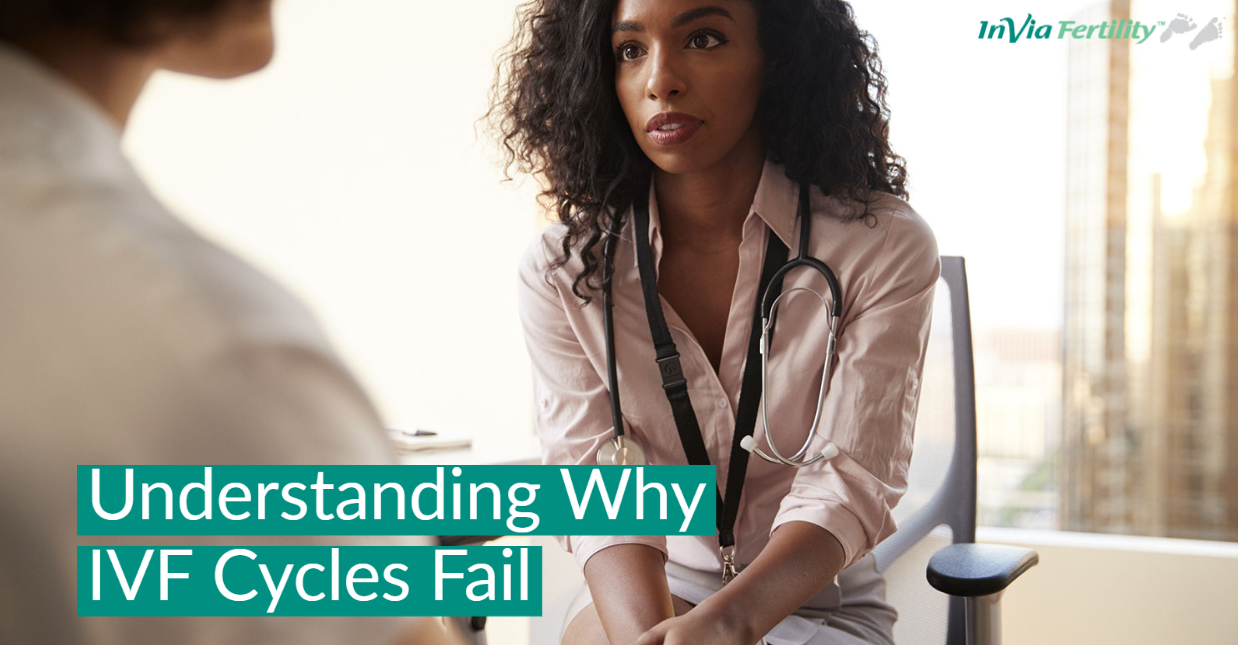We are experiencing a very high volume of calls and messages and ask for your patience. We will answer your portal messages within 48 hours.
We are experiencing a very high volume of calls and messages and ask for your patience. We will answer your portal messages within 48 hours.

 A failed IVF cycle is heart-wrenching. Your dreams of a pregnancy are shattered, your hard-earned money has gone down the tube, and you do not know what to do next! As humans we all need explanations for the failures we encounter.
A failed IVF cycle is heart-wrenching. Your dreams of a pregnancy are shattered, your hard-earned money has gone down the tube, and you do not know what to do next! As humans we all need explanations for the failures we encounter.
If we get an answer, then we tend to have peace of mind, because we believe that we can achieve success the next time around if we can avoid past mistakes. But when an IVF cycle fails, unfortunately, often there's no good answer as to why. So much about human reproduction is still yet to be discovered, that often even the most experienced doctor may not understand what happened.
You might have had a perfect cycle – lots of eggs, good fertilization rate, good quality embryos, excellent endometrium, easy embryo transfer – but no positive pregnancy test! On the other hand your friend might have had a very poor IVF cycle (with few eggs and poor quality embryos) and yet might end up getting pregnant! IVF is like a gamble – which involves risking not only your money, but also your baby dreams.
The fact is that once the embryo is transferred to the uterus, no one knows what happens to it after this. We don't yet have tests or imaging methods that let us track the fate of a microscopic ball of cells once they are inside the uterine cavity, so we cannot predict with much accuracy which embryos will implant and why. We are just as at a loss to explain why an IVF cycle succeeds as we are to explain why it fails!
The first person patients turn to when their IVF cycle fails is their doctor. He (or she) is the person who performed everything from the ovarian stimulation to the embryo transfer. He is the one who advised them to do IVF; and reassured them that they had a good chance of succeeding. Patients naturally think that their doctor should have an answer for the most important question that haunts them – "Why did my cycle fail?"
The most important duty of an IVF doctor is to prepare you for the possibility of an IVF failure. A good IVF specialist will spend time and energy to educate you about the uncertainty inherent in an IVF process. He will not falsely raise your hopes, and he will not promise you a baby.
However, the relationship between you and your doctor is a partnership. As a patient, you also have duties to perform to give yourself the best chance of success and avoid unnecessary stress in what is already a very stressful situation.
There are patients who get angry with their doctor when he cannot offer a satisfactory answer for the failure. They start imagining the worst – that their doctor did not perform the procedure well, or that the clinic is not competent, which is why the cycle failed.
Some might blame themselves, because they start thinking that their body is not conducive for achieving a pregnancy; that their uterus is not good enough to accept the embryo; and that they are not fit to carry a baby. Some believe that their body is defective or that it “rejected” the embryo. Many start obsessing about all the ‘mistakes’ they did during the two-week wait, from not taking enough rest to eating certain ‘forbidden’ foods. Some might even think that it is a punishment from God!
But a well-informed, IVF-literate patient understands that an IVF failure is nobody’s fault. Such mature patients get better emotional protection after an IVF failure because they do not blame others or themselves for the failure. They do not think their body is defective (and hence their self-esteem is not damaged); and they accept the failure with a strong heart and mind which will in turn help them to look forward for ways to make their baby dreams come true!
The short answer is: nobody knows. However, there are some possible explanations.
The problem with existing IVF technology is that there are no sure ways to find out which embryo is genetically normal and which endometrium is receptive. So, giving an exact reason for the IVF failure to an individual patient is not always feasible, because of the limitations inherent in today’s ART.
Human reproduction itself is a gamble. Consider a fertile couple that is trying to have a baby in their bedroom. Do their attempts at baby-making sex result in a baby every month they have intercourse during their fertile time? Of course not! A young, fertile couple may take up to one year to achieve a pregnancy - and they have just a 15–25% chance of conceiving in a particular menstrual cycle.
This shows that human reproduction is remarkably inefficient. During IVF the chance of achieving a pregnancy in a single attempt is significantly higher - most well-run clinics around the world have a success rate of 40-50%. But it is impossible to pinpoint why six out of ten women who undergo IVF fail to achieve a pregnancy, or why the other four are successful.
The following will not cause your IVF cycle to fail:
Patients don’t like being told doctors don’t have all the answers! This makes them uncomfortable, and they start doubting their doctor’s competence. If he cannot even answer such a basic question, then he must not be very good. Maybe we need to get a second opinion.
This is especially true when the doctor overpromises success before starting the IVF cycle. They promise them the earth and the moon – and when the cycle fails, they often abandon these patients and refuse to see them, as they don’t want to have to answer awkward questions. Even worse, rather than acknowledge the state of our ignorance, other doctors will concoct pseudo-scientific answers for the failure, such as immune rejection because of overactive NK cells in the uterus or HLA similarity between the partners.
They will then run a panel of expensive and painful tests (of no proven validity), and then find “abnormalities” which they will “treat” before starting the next IVF cycle. The patient is hooked, because she believes that the doctor has now pinpointed the fault – and now that it has been corrected, the next IVF cycle will definitely succeed! Many are sadly disillusioned when the next cycle also fails – and they then start belatedly doing their homework!
Even though the patient tries to understand that there is no valid explanation for an IVF failure, many times the heart is not ready to accept what the head says. After all, "the heart has reasons that reason does not understand". Since there are so many emotions connected with an IVF cycle, the heart of a patient naturally craves an explanation for the failure, so that the “fault“ can be rectified in the subsequent cycle.
This is where many IVF doctors play games with their patients – some for money, some unable to face patient’s questions, some because of the fear that they might lose the patient to other doctor and some in order to maintain their ‘I know everything’ image!
Some IVF doctors who are confronted with the question "why did my cycle fail?" may feel offended. Many feel that their clinic’s competency is being questioned! Some may even doctors will point fingers at you for the IVF failure. They might say your uterus isn't good enough; you didn’t take enough bed rest; you didn't follow my orders, etc. No doctor should increase your agony by making you feel you are the reason for the failed IVF.
Other doctors have a very paternalistic approach and feel that no one should question them. They take pride in their intelligence and in their ability to give answers to all the patient’s questions. When such doctors are confronted with the "why did my cycle fail?" question, they order a list of expensive, useless tests and subject the patients to treatments which have never been proven to be helpful.
Ironically, this gives immense satisfaction to patients, because they believe their doctor is striving hard to find where the fault is; and will be able to rectify it with expensive treatments. Patients convince themselves that costly treatments are highly effective and the doctor in turn gets the satisfaction that he has given appropriate answers to the patient’s question (because many of these test results turn out to be abnormal, even though the abnormality is of no clinical importance).
Only a mature doctor has the courage to give the honest answer – "I don't know."
The following treatments are not supported by any scientific evidence:
Try again! This is the only good answer, and a good IVF doctor’s answer will be exactly this. Of course, he may make changes based on your previous cycle, and he will explain these to you. A good doctor will try from the outset to manage your expectations and explain the realistic chance of success.
If you want to be a mature IVF patient, educate yourself about the process (starting with our free guide to IVF treatment). This will help protect you from an emotional breakdown; and from unnecessary tests and treatments.
There are clinics which want to make the IVF treatment a win-win situation. They offer a money back guarantee program. If you meet certain criteria, you qualify for a plan that lets you pay in advance for a certain number of IVF cycles and if you do not get pregnant within those cycles, they give you back your money.
This is a wonderful option, which could help you preserve your peace of mind, at least as regards the financial aspect. So before starting an IVF cycle, make sure that your clinic has such an option and ask them whether you qualify for such a program. We at InVia Fertility offer a Shared IVF Success Plan that does exactly this.
The field of IVF is highly commercial, and you need to protect yourself from being exploited by money-minded and irrational physicians. Your doctor is not always correct and unbiased. So please become well informed about the process before starting it. Find a good doctor who will have your best interests at heart.
If you are constantly diverted from your aim of having a baby by having to do unnecessary tests and treatments, you will get exhausted very soon. It makes going through subsequent IVF cycles impossible. Being knowledgeable and having realistic expectations about IVF will help you to remain strong, and will keep you going. Have courage-- and stay informed!
This blog was written by Dr Malpani and his expert patient Manju, who blogs at myselfishgenes.blogspot.com.
To see a fertility specialist with a strong success rate diagnosing and treating fertility issues, make an appointment at one of InVia's four Chicago area fertility clinics.

Entire Website © 2003 - 2020
Karande and Associates d/b/a InVia
Fertility Specialists
